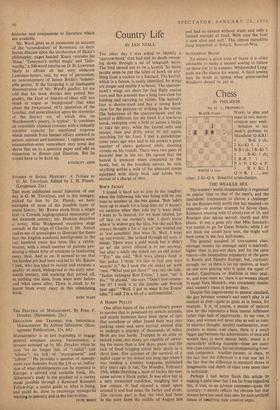Chess
By PHIL1DOR
No. 33 C. PROMISLO
1 . . B-K 6 ch;
2 Kt-Kt 5. 1 . . . 13-B I ch; 2 R-Kt 7.
I . . B-Kt 1 ch; 2 R-R 7. I . . . P x P; 2 Kt x P.
1 . . . R x Kt: 2
other; 2 Kt-Q 4. Beautiful cross-checker.
THE WEAKER SEX
The women's world championship is organised on similar lines to that of the men's, and the candidates' tournament to choose a challenger for the Russian-held world title has resulted—as expected—in another triumph for Soviet chess, Rubtsova winning with 15 points out of 19, and Russians also taking second, fourth and fifth places. It was a great pity that Miss Sunnucks was unable to go for Great Britain; while I do not think she would have won, she might well have come in the first half-dozen.
The general standard of tournament chess amongst women (as amongst men) is markedly higher than in pre-war days, and for the same reason—the tremendous popularity of the game in Russia and Eastern Europe; but, curiously enough, just as there is (in my opinion, at least) no one now playing who is quite the equal of Lasker, Capablanca or Alekhine at their peak, so, and even more so, there is no woman player to equal Vera Menchik, who completely domin- ated women's chess in prewar days.
Despite this improvement in general standard, the gap between women's and men's play is as marked as ever—quite as great as in tennis, for example. It is, of course, a matter of opinion how far this represents a basic mental difference rather than lack of opportunity. In my view, it does; and women will never play as well as men. In abstract thought, notably mathematics, com- position in music, and chess, there is a much bigger gap between the achievements of men and women than in most mental fields: music is a particularly striking example—these are many first-class executants, but no corresponding front- rank composers. Another pointer, in chess, to the fact that the difference is a real one lies in the fact that the difference in standard shows in imagination and, depth of ideas even more than in technique.
Perhaps I had better finish this article by making it quite clear that I am far from regarding this, if true, as an adverse comment—quite the contrary; it merely reflects the obvious fact that women have less need than men for such artificial means of satisfying their creative urges.


































 Previous page
Previous page